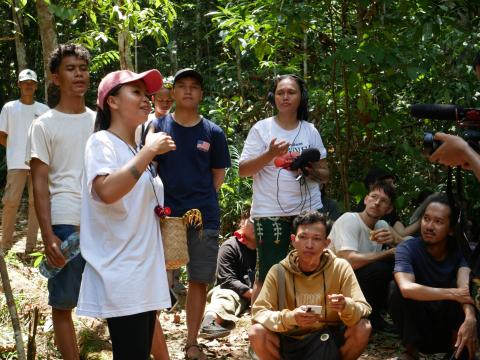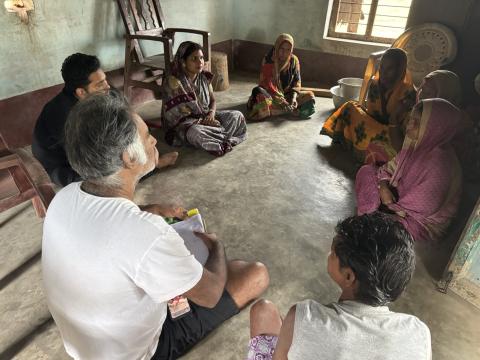Announcing the winners of the Knowledge into Use Awards
Announcing the winners of the Knowledge into Use Awards
The Resilience Evidence Coalition are excited to announce the winners of the Knowledge into Use Awards 2024. The awards celebrate innovative projects that are transforming communities through the practical application of climate resilience knowledge. Each winner received a prize of 100,000 Swedish Krona and support in showcasing their work.
This blog first appeared on the GRP website.
Meet the winners
Instituto Internacional de Medio Ambiente y Desarrollo – IIED América Latina

The Instituto Internacional de Medio Ambiente y Desarrollo – IIED América Latina, based in Buenos Aires, Argentina, is working with the community of Barrio 20 and city government to integrate climate action within an ongoing urban upgrading process. Since 2016, the Housing Institute of Buenos Aires (IVC) and its residents have been leading the participatory upgrading of Barrio 20, an informal settlement within the city of Buenos Aires. Since 2021, with the Transformative Urban Coalitions (TUC), IIED América Latina established an urban lab in Barrio 20 to discuss how to integrate climate action in a just and equitable way, and design and implement a series of pilot interventions that could raise awareness and build resilience. These interventions focus on nature-based solutions, citizen science to establish a weather monitoring system and awareness-raising activities like climate action murals strategically placed within the neighbourhood. In addition, an environmental circuit has been developed to point towards positive transformations. A series of exchanges have been generated and training materials, especially a manual on home and neighbourhood improvement following bioclimatic recommendations. Murals where designed and implemented together with students and professors of Morphology, Chair Pereyra, of School of Architecture, Design and Urbanism, University of Buenos Aires.
The Knowledge into Use Award supports IIED-AL to create more murals, within and beyond Barrio 20’s Environmental Circuit. The murals aim to depict everyday community life, illustrating sustainable practices such as vegetable gardens and recycling. They will also include citizen science results, including the temperature and humidity monitoring system and community-led surveys. The murals will serve both as artistic expressions and powerful tools for raising awareness, communicating local evidence and fostering dialogue around climate justice.
Sakolah Adat

The Arus Kualan Traditional School, established under the Arus Kualan Foundation in 2014, is a non-formal education institution located in Simpang Hulu, Ketapang Regency, West Kalimantan, Indonesia. This school, known as Sakolah Adat, aims to teach traditional knowledge and values to the younger generation by integrating modern and traditional wisdom. It combines art, science, and technology with a DIY (do-it-yourself) and DIWO (do-it-with-others) spirit. The school encourages the younger generation to preserve traditional music and instruments, vital assets of indigenous peoples. Importantly, it emphasises maintaining social-ecological resilience by fostering a deep connection between the community and their environment, ensuring that cultural heritage and natural ecosystems are preserved and celebrated together. Indigenous education at Arus Kualan is an effort to maintain customs and their values. The school invites children to preserve traditional dances and storytelling, known as “Sangsangan” in the Simpang Dayak language. For them, songs are more than beautiful sounds—they are stories. Inspired by the rainforest’s sounds, the children record these natural melodies and mix them into songs. They capture the electrical variations in plants using a tool attached to the leaves, transforming these variations into sound waves and then into music. Some of these sounds are further transformed into visual patterns using Chladni plates, which serve as references for embroidery, clothing, and traditional knitting.
The Knowledge into Use Award supports Sekola Adat to create plant music, an innovative artistic expression that not only captivates the senses but also conveys the profound resilience inherent in nature. Through the fusion of technology and artistry, they will harness the power of Raspberry Pi and sensors to capture the intricate bioelectrical signals emitted by plants. Translating the language of plants into a form that resonates with human emotions.
Socratus Collective Wisdom Corporation (Socratus)

Socratus Collective Wisdom Corporation (Socratus) is an organisation dedicated to using design, technology, and cognitive science to create spaces that evoke collective wisdom for solving complex problems. Socratus’ innovative theory of change and advanced technology enable citizens and experts to visualise and address the world shaped by the climate crisis.
Currently, research is underway for the Bengaluru edition, focusing on neighbourhood actions and sustainable cities. Additionally, research in Bhitarkanika National Park aims to address the area’s ecological and economic realities. Socratus is also working on an international artist’s edition of Climate Recipes, where artists will present speculative proposals about the future of our collective ecosystem. This initiative fosters intergenerational wisdom exchange and community engagement, providing positive templates to address climate change and ensuring that resilience practices are designed to be actionable and inclusive. Through these efforts, Socratus is empowering communities to create their own solutions, fostering a sense of collective responsibility and action.
The Knowledge into Use Award supports Socratus in creating climate recipes. These are concise, practical guides developed from conversations with experts in land, environment, and climate fields. The insights gathered are synthesised into short recipes and presented through text, illustrative drawings, exhibitions, and public programs. So far, Socratus has interacted with twenty-five experts in Goa, whose work spans foraging, sustainable architecture, immunology, urban planning, and food histories, among others. The ongoing Andhra Pradesh & Telangana edition brings together experts on natural farming, food systems, water conservation, and biodiversity restoration.
